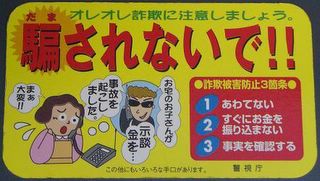Below is a picture of a sticker on the ATM at a bank in my neighborhood:
 |
Basically, the way it works is that people call up complete strangers and ask them to send money for some urgent need, like compensation for a traffic accident, an emergency abortion, or just to repay a loan shark. And people send them the money!
The General Insurance Association of Japan has more:
Perpetrators of ore-ore fraud usually pretend to be relatives of the target victims, such as their child, grandson, husband or others, and urge the victims to transfer a large amount of money to a certain account for non-existent problems. Recently fraudsters have been using a clever ploy to steal money, in that they form a group, sharing and performing several roles such as a policeman or an insurance company representative.The ATM sticker offers helpful advice:
Watch out for the "Ore Ore" scam.Call me culturally biased, but I don't think this scam would fly in New York.
DON'T BE FOOLED!
Three steps to avoid being ripped off:
(1) Don't panic
(2) Don't send money right away
(3) Confirm the facts

4 comments:
Perhaps that's a downside to a culture where most people are respectful and don't commit crimes. Still, it's surprising that you wouldn't talk to your relative and find out more details.
Yes, that wouldn't work here. "You knocked up your girlfriend? Sorry, Junior, that's your responsibility. Go get another job."
Posted by Greg
Of course, the question isn't whether it would fool savvy New Yorkers, but whether it would fool borderline senile grannies in Podunk, because that's the group that are usually targeted by oreore scams. The classic version is:
Evil Scammer: Hello Grandma, It's me. (this is where the Ore-ore comes in.)
Gullible Grandma: Is that you, Hiroshi?
ES: Yeah, yeah, it's um..Hiroshi. Listen Grandma, I'm in trouble, and Mom and Dad would kill me if they found out. Could you send me some money quick?
(Damnit, blogger won't let me use <blockquote> in comments anymore!)
Usually the victims don't check up on the background because the "grandson" is supposedly caught up in something embarrassing and begs them not to tell anyone. Recently the scams have gotten more complicated and involve more research by the scammers and, as GB noted, several scammers working together.
There are definitely cultural factors at work here--doting grandparents who rarely get to see their grandkids, cultural embarrassment about borrowing money that makes the "don't tell anyone" bit less suspicious, bank transfers rather than personal checks being the norm, etc.
It's like the phishing scams in the states--there are enough suckers out there to make this profitable.
Posted by Big Ben
Re: senile grannies in Podunk, I'm reminded of the episode of The Simpsons when Marge reminds Grandpa Simpson about how he fell victim to a telemarketing scam.
"Oh, it's not a scam," he says, "You give them all of your credit card numbers, and if one of them is lucky, you win a prize!"
Posted by GaijinBiker
Its pretty bad, in the place where I work most of the students have had a call or know someone who has.
The scams are indeed getting more complicated, as one student reported that the caller knew her husbands, name, job and what car he drove. It turns out the information had been stolen from her insurance company.
Posted by Stuart
Post a Comment